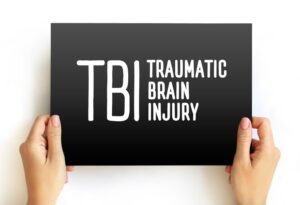Traumatic brain injuries (TBIs) often occur in accidents resulting from others’ negligence when individuals experience sudden impacts or violent movements. For example, in motor vehicle crashes, a collision can cause a driver or passenger’s head to strike the dashboard or window, leading to a TBI. Similarly, slips and falls on unsafe surfaces can result in individuals hitting their heads on the ground. Inadequate safety measures in sports or recreational activities can also lead to TBIs.
If you or a person you care about recently suffered a TBI due to someone else’s negligent behavior, you are not alone. A knowledgeable TBI lawyer in your area can immediately investigate the accident circumstances, determine your legal options, and begin pursuing the financial compensation you deserve.
Common Occurrences That Cause Brain Injuries
 TBIs can occur in various situations, often due to the negligence of others. These injuries can have serious, long-lasting effects on individuals, affecting their cognitive abilities, emotional well-being, and overall quality of life.
TBIs can occur in various situations, often due to the negligence of others. These injuries can have serious, long-lasting effects on individuals, affecting their cognitive abilities, emotional well-being, and overall quality of life.
One prevalent occurrence is motor vehicle collisions. When drivers fail to obey traffic laws, such as by running red lights or driving under the influence of drugs or alcohol, they put themselves and others at risk. A sudden collision can cause passengers and drivers to experience violent impacts, resulting in TBIs. Inattentive driving, including distractions from mobile devices, also plays a significant role in these crashes as it reduces the driver’s ability to react quickly to changing road conditions.
Another common situation involves slips and falls, particularly in public or commercial spaces. Property owners have a legal obligation to maintain safe premises. When they neglect this responsibility, such as failing to clean spills or fix broken stairs, they create hazardous conditions. Visitors can suffer serious falls that lead to TBIs. For example, a person slipping on a wet floor without warning signs can hit their head forcefully, resulting in a concussion or more severe brain injury.
Sports activities are also a significant source of TBIs, especially in contact sports like football, hockey, or boxing. Coaches and organizations must enforce safety protocols and educate players about the risks of head injuries. However, negligence in monitoring player safety or ignoring the signs of a concussion can lead to further complications. Young athletes, in particular, are at risk because their developing brains are more vulnerable to the effects of repeated impacts.
Pedestrian accidents can lead to TBIs when drivers fail to yield to pedestrians in crosswalks or speed through residential areas. This negligence puts pedestrians in harm’s way. When a vehicle strikes a pedestrian, the impact can cause them to hit their head on the ground or the vehicle itself, resulting in serious brain injuries.
Medical Treatment for a Brain Injury
After suffering a TBI in an accident due to someone else’s negligence, individuals may require a range of medical treatments to aid their recovery. The type and extent of treatment largely depend on the severity of the injury, which can vary from concussions to severe brain damage. Here are some common medical treatments that may be necessary.
- Emergency Care – Immediate medical attention is crucial following a TBI. If a person experiences a significant head injury, they may need to be transported to the emergency room. Medical professionals will conduct a thorough assessment, which often includes imaging tests such as CT scans or MRIs to evaluate the extent of the damage. In some cases, surgical intervention may be necessary to relieve pressure on the brain or repair skull fractures.
- Hospitalization – Following emergency care, individuals with more serious TBIs may require hospitalization for continuous monitoring and treatment. During this time, healthcare providers will focus on stabilizing the patient, managing pain, and preventing complications, such as infections or seizures. Rehabilitation specialists may also begin working with patients to establish a recovery plan.
- Rehabilitation – Rehabilitation is a critical component of TBI recovery, particularly for moderate to severe injuries. Rehabilitation may involve a multidisciplinary team, including physical therapists, occupational therapists, and speech-language pathologists. Physical therapy helps improve strength and coordination, while occupational therapy focuses on regaining daily living skills. Speech therapy may be necessary for individuals experiencing communication or swallowing difficulties.
- Medication – Various medications may be prescribed to manage symptoms associated with a TBI, including pain relievers, anti-seizure medications, and antidepressants. The goal of medication is to alleviate symptoms, improve overall functioning, and support mental health during recovery.
- Ongoing Care – Following initial rehabilitation, individuals may require ongoing medical care and monitoring. This care can include follow-up appointments with neurologists, psychologists, or other specialists to assess recovery and address any lingering issues, such as cognitive deficits or emotional challenges.
Medical treatment following a traumatic brain injury can be extensive, and the recovery process can also be long and challenging. An experienced TBI attorney can recover the compensation accident victims need for past and future medical expenses, as well as for pain, suffering, and inconvenience.
How Do You Prove a Brain Injury Case Successfully?
Proving the legal elements of a TBI case can be complex and requires a thorough understanding of the law and effective evidence gathering. There are four primary elements that must be established: duty, breach, causation, and damages. Each element relies on different types of evidence to support the claim.
- Duty – The first step is demonstrating that the at-fault party (defendant) had a legal duty to act in a certain way, which can be shown through testimony or documents that establish the standard of care expected in the situation. For example, a driver has a duty to follow traffic laws, while a property owner must maintain a safe environment. Evidence such as industry standards, regulations, and expert testimony can help establish what the duty was in a specific case.
- Breach – Once duty is established, the next step is to prove that the defendant breached that duty, which involves showing that their actions (or inactions) fell below the accepted standard of care. Helpful evidence includes eyewitness accounts, photographs of the incident scene, and surveillance footage. For instance, if a person slips and falls in a store due to a spilled liquid, store maintenance records can show whether the owner took reasonable steps to address spills.
- Causation – Causation connects the defendant’s breach to the injured party’s (plaintiff’s) injury, which means proving that the negligent act directly caused the TBI. Medical records play a crucial role here, as they document the injury and provide insights into its severity and potential causes of TBI. Expert medical testimony can also help clarify how the accident led to the brain injury. For example, a neurologist may explain how the impact of a car crash resulted in a concussion.
- Damages – Finally, the plaintiff must demonstrate that they suffered damages as a result of the TBI. These damages include both economic damages, such as medical expenses and lost wages, and non-economic damages, for example, pain and suffering. Evidence for this element can include medical bills, pay stubs, and personal journals detailing the repercussions of the injury on daily life. Expert testimony from medical professionals, psychologists, or vocational experts can also help quantify the damages and illustrate their long-term effects.
Gathering and presenting this evidence effectively can significantly strengthen a TBI case and improve the chances of a successful outcome.
How Much Is a Brain Injury Case Worth?
The value of a TBI case can vary widely, depending on several factors. Understanding these factors is essential for anyone seeking compensation after such an injury, as it can help set realistic expectations for potential recovery.
- Severity of the Injury – One of the most critical factors is the severity of the TBI. Concussions may lead to lower compensation amounts, while TBIs that result in long-term disability can significantly increase the case’s value. Medical records detailing the injury’s extent, treatment, and long-term effects will play a crucial role in assessing the overall value.
- Medical Expenses – The cost of medical treatment directly affects the compensation amount. These expenses include initial hospital bills, ongoing therapy, rehabilitation costs, and any future medical care that may be necessary. The more extensive the medical treatment required, the higher the potential compensation. Documentation, such as medical bills and treatment plans, is essential for substantiating these costs.
- Lost income and Earning Potential – If a TBI affects an individual’s ability to work, lost earnings and future earning potential become vital components of the case. Compensation may cover the time missed from work during recovery and any reduction in future income if the injury affects the person’s ability to pursue their career. Pay stubs and employment records can help calculate these losses.
- Pain and Suffering – Non-economic damages, such as pain and suffering, emotional distress, and loss of enjoyment of life, can also contribute to the overall value of a TBI case. These damages are often harder to quantify but are crucial for reflecting the injury’s repercussions on a person’s quality of life. Testimonies from family members, friends, and mental health professionals can support claims for these types of damages.
- Liability and Insurance Coverage – The degree of negligence or liability attributed to the responsible party can also affect compensation. If multiple parties are involved, the distribution of fault may complicate the case. In addition, the amount of insurance coverage available from the liable party will influence the maximum compensation achievable.
How Can an Experienced Attorney Help You with Your Brain Injury Case?
 A skilled lawyer experienced in TBI cases can provide essential support and guidance throughout the legal process. Their experience can significantly affect the outcome of your case, ensuring that you receive the compensation you deserve for your injuries. The following are several ways a TBI attorney can assist you.
A skilled lawyer experienced in TBI cases can provide essential support and guidance throughout the legal process. Their experience can significantly affect the outcome of your case, ensuring that you receive the compensation you deserve for your injuries. The following are several ways a TBI attorney can assist you.
- Case Evaluation – A skilled lawyer will begin by evaluating the specifics of your case. They will assess the circumstances surrounding your injury, the extent of your damages, and the potential for establishing negligence. This initial evaluation helps determine the viability of your claim and outlines the best legal strategies moving forward.
- Gathering Evidence – Proving a TBI case requires substantial evidence to establish liability and damages. A skilled attorney knows which types of evidence are critical, including medical records, accident reports, witness statements, and expert testimonies. They will work diligently to gather and organize this evidence, thereby building a strong case on your behalf.
- Expert Collaboration – TBI cases often require the insights of medical experts to explain the nature and effect of the injury. A knowledgeable lawyer can connect you with neurologists, psychologists, and rehabilitation specialists who can provide testimony regarding your injury’s severity and long-term effects. These expert opinions can be crucial in establishing the extent of your damages and the necessity for ongoing care.
- Negotiating with Insurance Companies – Dealing with insurance companies can be challenging, especially when they try to minimize payouts. An attorney experienced in TBI cases knows how to negotiate effectively with insurance adjusters. They will advocate for your rights and work to secure a fair settlement that reflects the full extent of your injuries, including medical expenses, lost income, and pain and suffering.
- Litigation Preparation – If negotiations fail to yield a satisfactory settlement, a knowledgeable attorney is prepared to take your case to court. They will handle all aspects of litigation, from filing the necessary paperwork to representing you during the trial. Their understanding of court procedures and legal standards can greatly enhance your chances of a successful outcome.
- Emotional Support – Suffering a TBI can be overwhelming, and navigating the legal system can add stress. A compassionate lawyer can provide emotional support and reassurance during this challenging time. They will keep you informed throughout the process, allowing you to focus on your recovery.
A skilled TBI attorney plays a vital role in advocating for your rights and ensuring that you receive the compensation you deserve. Their experience in evaluating cases, gathering evidence, negotiating settlements, and preparing for litigation can make a significant difference in the outcome of your case.
Call a Knowledgeable Brain Injury Lawyer in Your Area Today
If you or someone you love suffered a TBI in an occurrence due to someone else’s negligence, you have legal rights and options available. A skilled personal injury attorney can aggressively advocate for your interests at every stage of the case and work to maximize the compensation award you receive for your injury.



